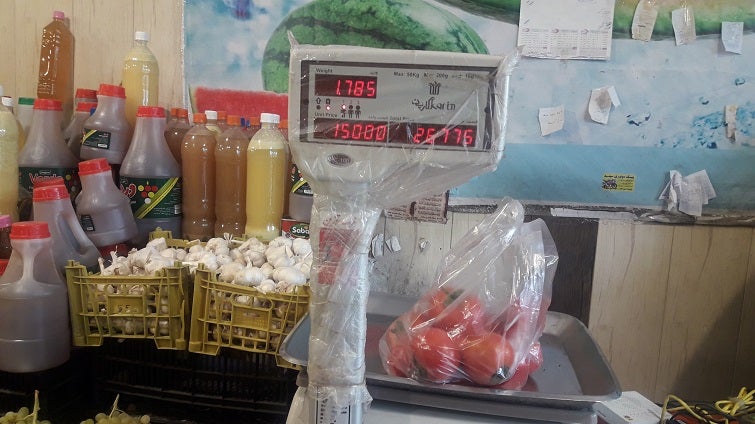
A market in the Sharif Awa neighborhood of Sanandaj, western Iran on November 28, 2019. Photo: Jabar Dastbaz / Rudaw
SANANDAJ, Iran – November's nationwide protests against the tripling of fuel prices in Iran spurred violent government repression. The country’s shops have since gotten back to business - but as a result of the price hike, foodstuffs like tomatoes have unexpectedly skyrocketed in price, leaving ordinary Iranians reeling.
I visited a little bazaar in the Sharif Awa neighborhood of Sanandaj, home to middle-class families. Prices did not hang beside food items at the grocery stalls.
Wherever I went, whoever I spoke to - people looked unhappy.
At some stalls, vendors would only allow me to photograph them if I bought tomatoes from them. Farzin was one of those vendors.
"We would absolutely love to sell our goods for low prices," Farzin said. "We are forced to sell them at a high price because we buy them for 12,000 tomans from the public vegetable market.”
“We pay the monthly rent of three million tomans ($250) for our shops. That is why we are forced to sell a kilo of tomato for 15,000 tomans," Farzin, who refused to provide his second name, told Rudaw English.
"People are no longer able to buy food the way they’d like to. Sometimes, customers come to buy just two tomatoes, a few cucumbers, and some lemons. They do it to have something to eat for a single meal," he said.
'No one dares buy anything'
Parsa, 27, has been working at the wholesale food market for seven years now.
"A month ago, farmers would come and beg us to buy their tomatoes. If the quality was very good, then we would buy a kilo for 500 tomans. Now, we receive good quality tomatoes for 11,000 tomans. The price at the customers’ end is up to 15, 16 thousand tomans."
"I have never seen such inflation, especially the kind that followed the increase in fuel price. Prices have gone up to the point that no one dares buy anything,” she went on to say.
“It is not just tomatoes - most fruit and vegetable prices have increased three to four fold.”

As Parsa pointed out, there was once a time when farmers struggled to sell their tomato crop. Farmers like Mohammed, 52, would have to dump them on roads outside of cities.
"What we are living in isn’t fit to be called a country,” Mohammed said.
Last year, he planted five dunams of farmland with tomato and cucumber. “For an entire year, together with my wife and children, I struggled to grow my tomatoes.”
“I eventually had to sell them for 300 tomans – and even then, no one would buy them.”
"I gave up and decided to never repeat this work. This is all thanks to the negligence of officials who have no plans for farmers and people in general," he decried.
Inflation has affected the meat market, too.
"This economic crisis has made us all lose our temper. There are customers who beg from us, saying their children are sick and they need just a morsel of meat. You come across tens of people like this every day," said 35-year-old butcher Saywan.
"My job has become very difficult," he says. "In the past I would sell a kilo of meat for 80,000 tomans. Now, I sell it for 100,000."
'We cannot control the prices'
The government's market monitor committees say they cannot stop the inflation.
Though their task is to prevent the market’s goods from getting too costly, “economic inflation has made us unable to do our work effectively because there are items whose prices fluctuate just as dollar does," a member of Sanandaj’s commodities and foodstuffs committee told Rudaw English.
Until the market returns to its normal state, committees have their hands tied, the official said.
Speaking on condition of anonymity due to restrictions on speaking to the media, he attributed the price hikes to "the shock of the increase in fuel price, as well as lack of adequate places to store food items."
"We do not have the manpower to visit the markets every day,” he said. “We cannot control the prices."
'Please, do something'
Back at the market, I spotted an elderly woman, who I approached to speak to me about her situation.
"Due to my illness, they [government] advanced my retirement. I receive a pension of just 600,000 tomans ($50) a month. Tell me, how can I afford to survive in this difficult situation?'" Manija Mohammed, 65, lamented. "What should I pay for first - electricity, water, or food?"
"How can God accept that the price of a kilo of tomato has risen to 15,000 tomans?" she asked. "In just one visit to the bazaar, you have to spend 200,000 tomans."
"I do not have a husband. My son, who is a teacher, is the only one who helps me. But he has children to take care of, and has a difficult life."
As our conversation continued, she burst into tears.
"My 29-year-old son Hamid Taemuri committed suicide last year due to poverty and joblessness. My son left me. Please, do something for the other young people."
Translated by Zhelwan Z. Wali








Comments
Rudaw moderates all comments submitted on our website. We welcome comments which are relevant to the article and encourage further discussion about the issues that matter to you. We also welcome constructive criticism about Rudaw.
To be approved for publication, however, your comments must meet our community guidelines.
We will not tolerate the following: profanity, threats, personal attacks, vulgarity, abuse (such as sexism, racism, homophobia or xenophobia), or commercial or personal promotion.
Comments that do not meet our guidelines will be rejected. Comments are not edited – they are either approved or rejected.
Post a comment